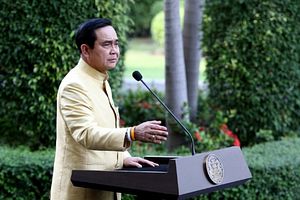Since they took power in a coup last May, Thai generals have been quick to use their country’s courts to hold ousted Prime Minister Yingluck Shinawatra responsible for losses incurred through her government’s disastrous rice-pledging scheme. By that same standard, they should be held accountable for the country’s economic woes during their rule thus far.
Thai exports are taking a significant hit as the world digests the Chinese share market collapse and subsequent devaluation of the yuan as well as is impact on neighboring manufacturers and currencies. That is testing the National Council for Peace and Order (NCPO).
The economy and exports were already struggling when Gen. Prayut Chan-o-cha seized power from Yingluck’s elected government in May 2014. But declines have accelerated in recent months with shipments of agricultural and agribusiness products taking big hits.
Exports account for 70 percent of Thailand’s GDP and have been in steady decline for three years, dropping 0.3 percent in 2013 and 0.4 percent a year later when the country was gripped by internal political strife culminating in a coup d’etat in May 2014.
For October, they plunged 8 percent over the same period a year ago. That followed a 5.5 percent drop in September and a 6.69 percent year-on-year fall to US$7.7 billion in August.
Imports have also plunged, indicating weak domestic consumption and poor economic growth.
Officials had initially blamed the fall on weak currency policies adopted by competing exports countries in the wake of China’s devaluation and the slower than expected global economy which has seen a drop off in demand amid lower commodity prices.
But in response to this month’s falls, the Bank of Thailand (BOT) was direct in attributing the weak trade data to the slowdown in Chinese and Southeast Asian economies.
Tourism has been hard hit, falling just 1 percent year-on-year in October compared to an 8.7 percent gain in September. And though Chinese tourist numbers were up but substantial falls were recorded among arrivals from other destinations, in particular Russia and Malaysia.
Cracks are appearing in the regional economy following the summer market rout in China despite the latest rally in regional markets, widely viewed as a dead cat bounce by market analysts.
The latest comments on China are also refreshing given media restrictions and perhaps self-censorship which has taken some media commentary in Thailand to absurd levels under the military government. Anything said even remotely negative about Beijing risks upsetting the Thai generals.
This has added to the pall of weak sentiment surrounding the region, complicated by an array of different issues within individual countries.
Losses incurred by the notorious 1MDB fund in Malaysia have been complicated and exaggerated by a flight of foreign capital and the collapse of the Malaysian ringgit to its lowest levels since the 1997/98 Asian Financial Crisis.
Equally, regional institutions like the Mekong River Commission (MRC) which depend on foreign funding – in particular European currencies, the Australian dollar and the Japanese yen – are having a tough time. Cambodia added to poor regional sentiment in November after the opposition leader fled into exile in response to threats of jail by Prime Minister Hun Sen, upsetting foreign investors.
Thailand has also been forced to carry the added burden of a military government with no economic experience amid expectations that the global financial outlook and in particular the East Asian economies are heading for a turbulent ride.
In fact, the October Thai export numbers were the 10th consecutive monthly contraction. According to economists these numbers indicate there will be no export recovery in the near term.
This should be taken on board by the Thai military government and the individuals responsible for the economy who might one day be asked to compensate long-suffering Thais for the losses their coup and subsequent time at the helm had cost them.
After all, that is what they want from Yingluck.
Luke Hunt can be followed on Twitter @lukeanthonyhunt
































